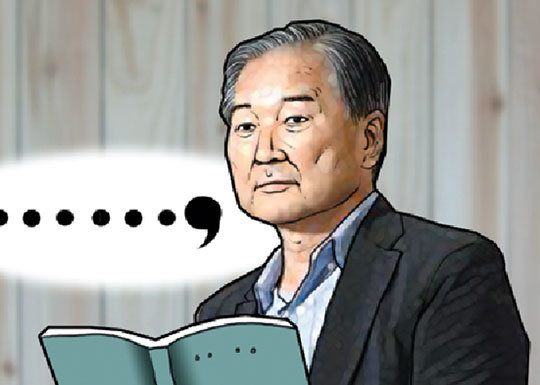A comma of longing
A comma of longing
Posted October. 24, 2018 07:26,
Updated October. 24, 2018 07:26

A sentence is completed with a period but emotions that are delivered by the sentence reject the period. It is particularly so in the sentiment of a longing towards an absent subject. The “Winter Cemetery,” by Korean poet Ma Jong-gi, depicts a longing that refuses the period.
What is unique about this poem, which starts with the line “when standing in front of a desolate grave of my flesh and blood,” is that the period that was inserted in all other lines disappears at the last line: “The sky comes down lower and we hold hands. The snow stops in no time, the wind subsides, and us,” A normal poem would not end incompletely like this and even if it does, a period would be in the place of a comma. The comma, which is in the place of a period, guides us through the wound of the poet.
The flesh and blood the poet refers to in his poem is his younger brother who passed away. As can be identified from the poet’s expression of his feelings in multiple elegies and prose, he shared a tight brotherhood as if there were no one who would be so close to one’s sibling as the poet. The brother, whom the poet cherished so much, was killed by a black robber while living in a foreign country. The shock he faced was unfathomable. No period could be placed to the poet’s emotion of sadness and mourning. This is the reason why the last line, “The snow stops in no time, the wind subsides, and us,” does not end in a period but in a comma. The poet wanted to say that he “wanted to continue his relationship with his brother sometime, even after death,” which is the comma of longing.
What makes this comma even more beautiful is the absence of hatred and vengeance. When the poet heard that a death sentence was pronounced to the criminal, he submitted an opinion letter to the US court with his brother’s son, that is, his nephew, to oppose executing the death sentence. This was not to realize a grandiose humanitarianism. The poet submitted an opinion letter because he believed that killing a person is not the job of a human being but the ‘authority of the Lord.’ His role was not hatred or vengeance but a feeling of longing that is continued with a comma and the hope that he will meet his brother, the subject of his longing, after his life ends. The comma in the place of a period is a comma of longing and hope.







